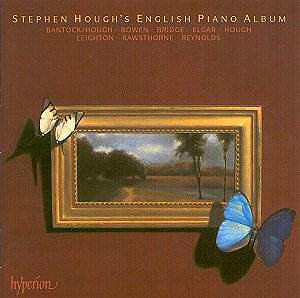Stephen Hough is one of our finest pianists. He has
an extensive repertoire embracing much that is outside the well-trodden
paths of many recitalists. Unlike so many performers these days – on
whatever instrument – he also tries his hand at composing (and arranging)
for his instrument.
This very attractive Hyperion release is representative
of his skills and is of especial interest to lovers of British music.
Few of the items thereon will be widely known, apart from Alan Rawsthorne’s
Bagatelles, which express so much in such a brief compass, and
the colourful and thoroughly characteristic In Smyrna which has
been swept up in the Elgarian revival of the past 40 years. (It may
be more popular now than in Elgar’s lifetime). The gossamer–like Bridge
miniatures are post–1918 but are in his pre-Great War lighter vein which
yielded so much for our delight.
York Bowen’s large output may work against his popularity
as it does in the case of others among music’s big producers. I had
previously heard none of these three pieces which form a rewardingly
varied group: Reverie d’Amour’s lushness contrasting well with
the wistful Serious Dance and the happy-sounding, if restrained,
Way to Polden (Polden is thought to be in Somerset).
Stephen Reynolds, born in 1947, is a new name to me
as a composer (he has achieved distinction as a pianist). These four
Poems are lighter interludes in a more "serious" compositional
output. Delius and Fauré are two of his favourite composers and
the Poems are attempts to write in their respective styles. I
could detect little that was Delian in the brief and charming Rustic
Idyll but considerably more in the much longer Serenade and Dance
of Spring. The Fauré Poems are most enjoyable, too,
their fluency arguing that Fauré the song composer was their
primary influence.
Mr Hough figures as a composer in the Valses Enigmatiques,
enchantingly light in texture and apparently full of personal allusions’
which (like Elgar’s Enigma Variations) need not concern the average
listener. I liked, too, his sensitive and affectionate arrangement of
Bantocks Song to the Seals.
Most of this repertoire can reasonably be dubbed light
piano music, of which British composers have written a huge amount and
which I suspect has given enormous, if largely untold, pleasure down
the years. The exception is Kenneth Leighton’s Studies, which
are much more craggy and astringent than anything else here, but whose
rhythmic imaginations, culminating in a very rapid and excitingly percussive
finale, repay the closest listening. Their superb piano writing reminds
us that Leighton was a fine pianist. Mr Hough clearly values them highly
and this may well be the definitive performance.
Good recording; I am happy to recommend this disc strongly.
Philip Scowcroft


![]() See
what else is on offer
See
what else is on offer 